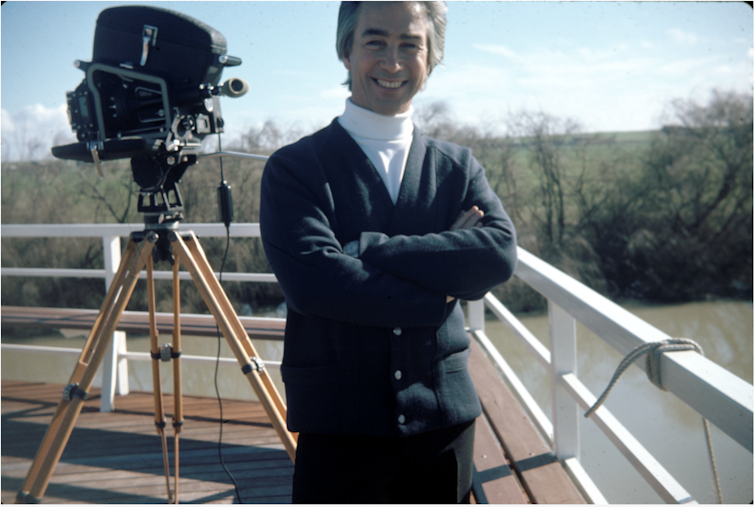how a story about Aussie shearers launched a local film industry
- Written by Michael Walsh, Associate Professor, Screen and Media, Flinders University

Released 50 years ago, Sunday Too Far Away deals episodically with a group of shearers led by Foley (Jack Thompson), and the events leading up to the national shearers’ strike of 1956.
The shearers are a ragtag group held together by rum, unionism and competitiveness – as Foley must deal with the camp cook from hell, as well as a threat to his “gun” status.
As we celebrate the anniversary, it is hard to overstate its importance for the Australian film industry and for its producer, the South Australian Film Corporation (SAFC).
The beginnings of a funding body
After the Liberal and Country League had held control over the state government for 32 years under a “Playmander”, named for premier Thomas Playford, the Labor party, lead by Don Dunstan, was elected in 1970 on a progressive platform.
As part of Dunstan’s project of moving the state’s economy away from its Playford-era reliance on manufacturing to more knowledge-based service industries, the SAFC was founded in 1972.
Central to Dunstan’s plan was the imperative that the SAFC should produce feature films – despite an initial consultant’s report that advised against this.
Dunstan’s plan was visionary, making South Australia the first state government to directly produce features. But it was also flawed.
The Dunstan government authorised the SAFC to borrow A$400,000 (approximately $5 million in 2025 money) for the production of up to five features per year, with the remainder of the budgets coming from Commonwealth funds and private investors.
The plan was that the SAFC’s productions would be self-supporting within five years, with the initial pump-priming loans repaid.
By 1973 a slate of features was in the works, though none would reach production.
One of these was Gallipoli, to be made in conjunction with Melbourne-based Crawford Productions, with screenwriter John Dingwell attached.
The film was shelved, but Dingwell maintained his relationship with Matt Carroll, the SAFC’s head of feature production. They developed a script titled Shearers, based on anecdotes from one of Dingwell’s relatives.
Sunday Too Far Away (as the film was retitled) was budgeted at $231,000, with the Commonwealth Government’s Australian Film Development Corporation, established in 1970 to invest in local films, providing half this figure.
An ‘emotional experience’
Gil Brealey, the SAFC’s first CEO, was desperate to get a feature started and was prepared to find the whole of the budget if necessary. (The SAFC would put up an additional $14,000 in budget overruns caused by wet weather in the semi-arid locations around Port Augusta and Quorn.)
It was a remarkable demonstration of maximum involvement by a government body intent on intervening dramatically to generate a production industry in a state that would otherwise lose out to the larger states on the eastern seaboard.
At the recent 50th anniversary screening hosted by the SAFC, producer Matt Carroll referred to the film shoot as “an extraordinary emotional experience” for all involved, stressing the strong camaraderie among the actors, which mirrored that of the shearers in the film.
It is useful to compare Sunday to 1971’s Wake in Fright.
Both centre on rural male mateship, but while Wake in Fright is revolted by it, Sunday strives for an elegiac celebration that might have drawn from Henry Lawson, of union-based mateship as the only defence again the harshness of life.
Fraught politics
Brealey and the SAFC were functioning under enormous political pressure for this film to be not only a critical, but also a popular success.
From the outset, the SAFC had been identified with Dunstan, and it was under almost daily attack in Parliament, led by Liberal frontbencher Stan Evans.
Quoted in the Adelaide Advertiser in May 1975, Evans denounced the SAFC “for actively producing and manufacturing films when its role under the Act precluded it from this field”.
He was joined in these attacks by elements of the local press, as well as a handful of filmmakers who felt slighted by talent imported by Brealey.
The board was forced to issue a statement, complaining of
a very small vocal minority who, apparently, find the success of the corporation personally offensive and make every effort to ‘knock’ its work.
The acceptance of the film into the Directors’ Fortnight at Cannes, the first Australian film bestowed the honour, was a godsend. It went on to win eight of the 12 awards on offer at the Australian Film Institute Awards.
Brealey wryly told me that “we had this appalling reputation in Adelaide and everyone else thought we were marvellous”.
The film renaissance
In order to shore up its local standing, the SAFC ran a film day at the Adelaide Festival Centre, culminating in a “world premiere” of Sunday attended by Gough Whitlam.
The next day, the SAFC released the film itself in Adelaide, hiring the Warner cinema where it ran for 26 weeks under an arrangement that gave the producer the entire gross, less the exhibitor’s expenses.
Brealey was extremely suspicious of Australian distributors. Roadshow distributed the film throughout the rest of Australia. By October, they were reporting box office grosses of over $182,000 – though the SAFC had only received $11,000 in returns.
The bitter lesson was that SAFC had clearly been founded on overly optimistic expectations of returns to producers. Feature production in Australia would need on-going government support.
The success of Sunday Too Far Away, followed closely by Picnic at Hanging Rock (1975) and Storm Boy (1976) succeeded in establishing the SAFC as a prime mover in Australian film.
Locally, it won bipartisan local support for the SAFC and nationally it established a model for emulation by other states.
It demonstrated that Australian films could combine local and international appeal, and that government agencies had a vital role at the heart of the film renaissance.
Authors: Michael Walsh, Associate Professor, Screen and Media, Flinders University





